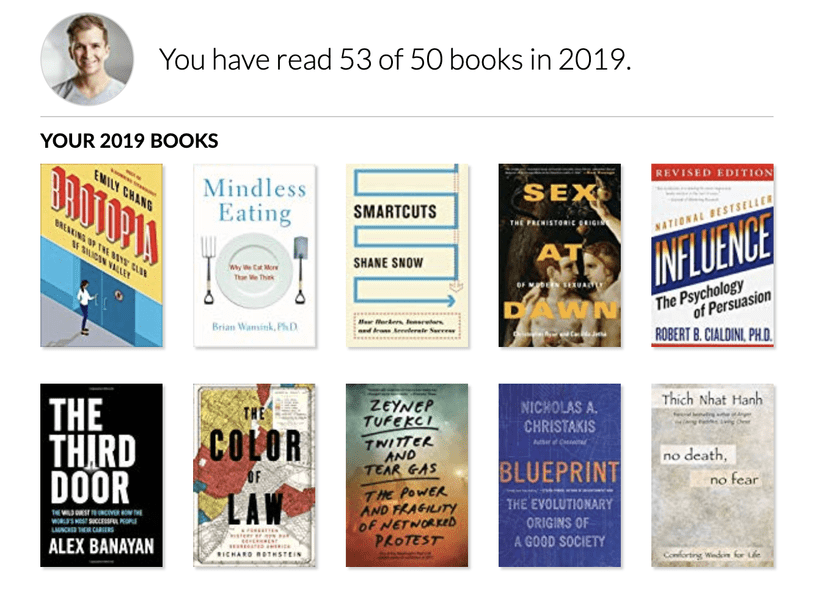
2019 is over, and so is my reading challenge for the year. Thanks, Goodreads, for keeping me accountable; you are doing an excellent job!
My favorite topics for 2019 include habit building, sociology, economics, and climate change. The four books below are the ones that have influenced my life in many different ways, and I will never forget their message. Let’s get into it!
1. “The Power of Habit”, by Charles Duhigg
This was one of the first books I’ve read, and it managed to set the tone for the rest of the year. Charles does an excellent job of explaining the science behind our habits, how to change them, and how can they elevate our lives to the next level.
It’s not only packed with information, but it’s also entertaining. Each chapter combines fascinating case studies from the world of marketing, social movements, healthcare, and more with actionable steps we can start implementing right away.
The bottom line? Progressing slowly towards our goals every day is more powerful than taking one giant step once in a while. After some time, we start running on autopilot, which saves us a lot of brainpower.
2. “So you want to talk about race”, by Ijeoma Oluo
Unfortunately, white privilege is a real thing. I never had an issue when I was mistreated because of my race. Growing up in a homogeneous community, I did not even think about this.
Everyday racism is a big part of the problem. We might think that it’s not a big deal to tell that racist joke or touch our wallets as a person of color is walking by. It’s like daily habits; these “small” things add up and affect people’s mental health.
I believe this is an important book that everyone should read, especially if you are white-skinned. It will give you a deeper understanding of what people of color go through daily and how can they be at a disadvantage just because of their skin.
The bottom line?We can improve once we are aware of the problem, and we have a long way to go. Creating inclusive and diverse societies would lead to massive sociological and economic benefits.
3. “This Changes Everything”, by Naomi Klein
This one is about the climate crisis. I was always aware of the problem, but I never went deeper into it. Everything changed after watching the ”50 minutes to save the world” video.
Despite a scientific consensus on climate change, there are still a lot of people who deny it. This is possible mainly because of the productive efforts of oil and gas corporations, who will lose lots of money, given stricter regulations around CO2 emissions. They go as far as organizing climate change denial conferences, working with “scientists” to produce anti-global warming papers and lobbying. The tobacco industry used the same strategy in the 1950s.
The bottom line?Climate change is real, and we should treat it as an emergency. Being a conscious consumer and putting pressure on our governments are two actions everyone can start taking.
4. “Misbehaving”, by Richard H. Thaler
Economists like to fantasize about humans being rational and considering all alternatives to make the best possible decision. They refer to homo sapiens as ”homo economicus“(or econs as Thaler calls it). That’s utterly absurd.
Adults make around 35000 remotely conscious decisions every day, and it would be impossible for all of them to be rational. We are often impulsive and make decisions based on emotions. Econs would cooperate only if they get the most value by doing so. You get the point.
The opportunity cost theory was my favorite part of the book. If, for example, the question is “is it worth fixing my bike and saving 10 euros?”, we should also take into account the opportunities we miss out by doing so. The time spent commuting to the shop and doing the repair could be spent on something more meaningful(working on a side hustle, connecting with a friend, or reading a book).
The bottom line?As with everything, being aware of our behavior is the first step towards progress. Whenever I have to make a decision, I try to ask myself if ”is this what an econ would do?”. This practice helps me to zoom out and see the bigger picture.
Final thoughts
Reading is one of my favorite activities and has helped me to navigate better the complex world we live in. I would not be the same person without all these insightful books.
These are just some of the books I’ve read during the year. Check out my Goodreads if you are looking for more book recommendations, or reach out to me and let’s chat.
What were your favorite books in 2019? Please send it to me. I am always interested in great books.
Thanks for reading!